10 Natural Sore Throat Remedies
This post may contain affiliate links. Read my full disclosure here.
If your throat’s raw and aching, you don’t need to hit the drugstore. Relief is as close as your pantry. I’m sharing some of my “go-to” sore throat remedies to help you feel better fast.
There are remedies for kids and adults. You can mix and match these depending on what you have on hand. Everyone is different, so listen to your body and see what feels best. Self-care is an important part of resilience.

#1 – My Top Sore Throat Remedy – Apple Cider Vinegar Tea
Apple cider vinegar tea combines warm water, herbs, lemon, ACV, and honey to soothe your throat and reduce inflammation. It’s my preferred remedy for a sore throat, and also helps with sinus congestion and drainage. I discovered this mix a few years ago, and it’s a “must have” for cold season.
Get the recipe for apple cider vinegar tea.
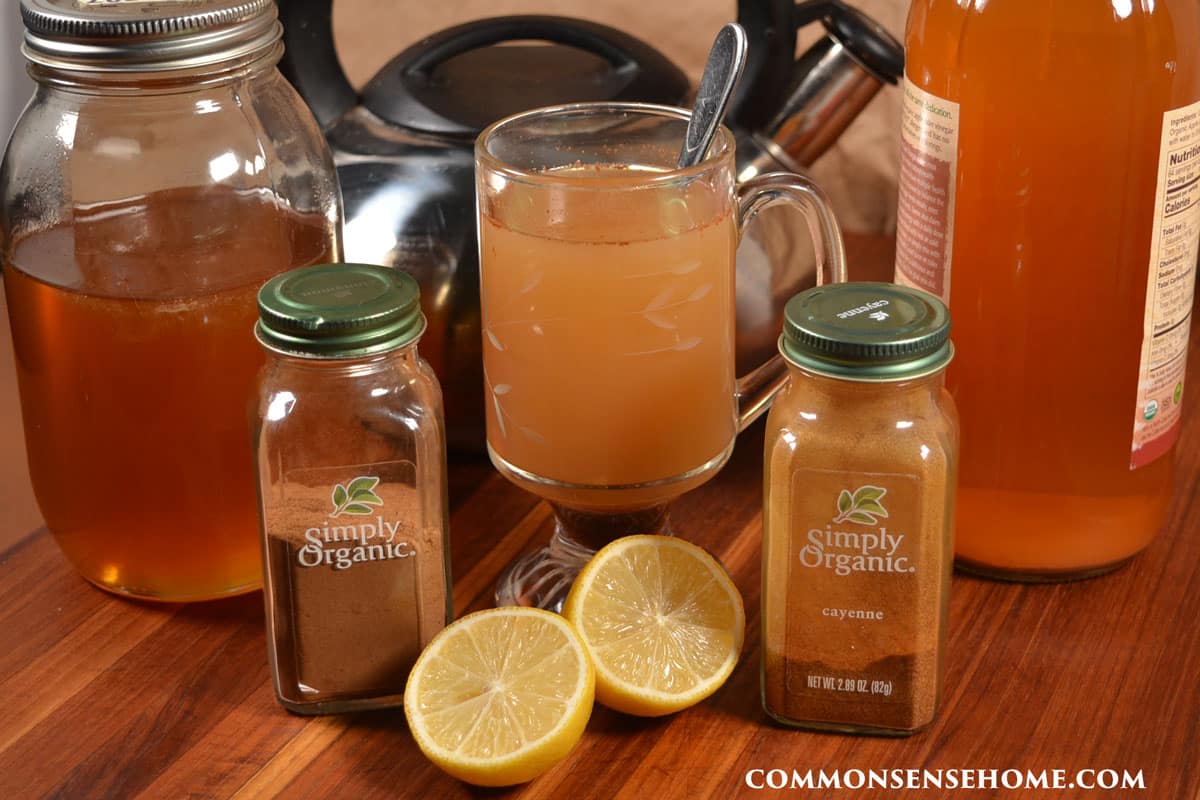
#2 – Tomato Tea
Savory tomato tea mixes garlic, ginger, cayenne and other spices in a tomato base. You can start with V-8 juice, or plain tomato juice, and adjust the heat to taste. This is a good remedy for the folks who like spicy foods.
Get the recipe for tomato tea.
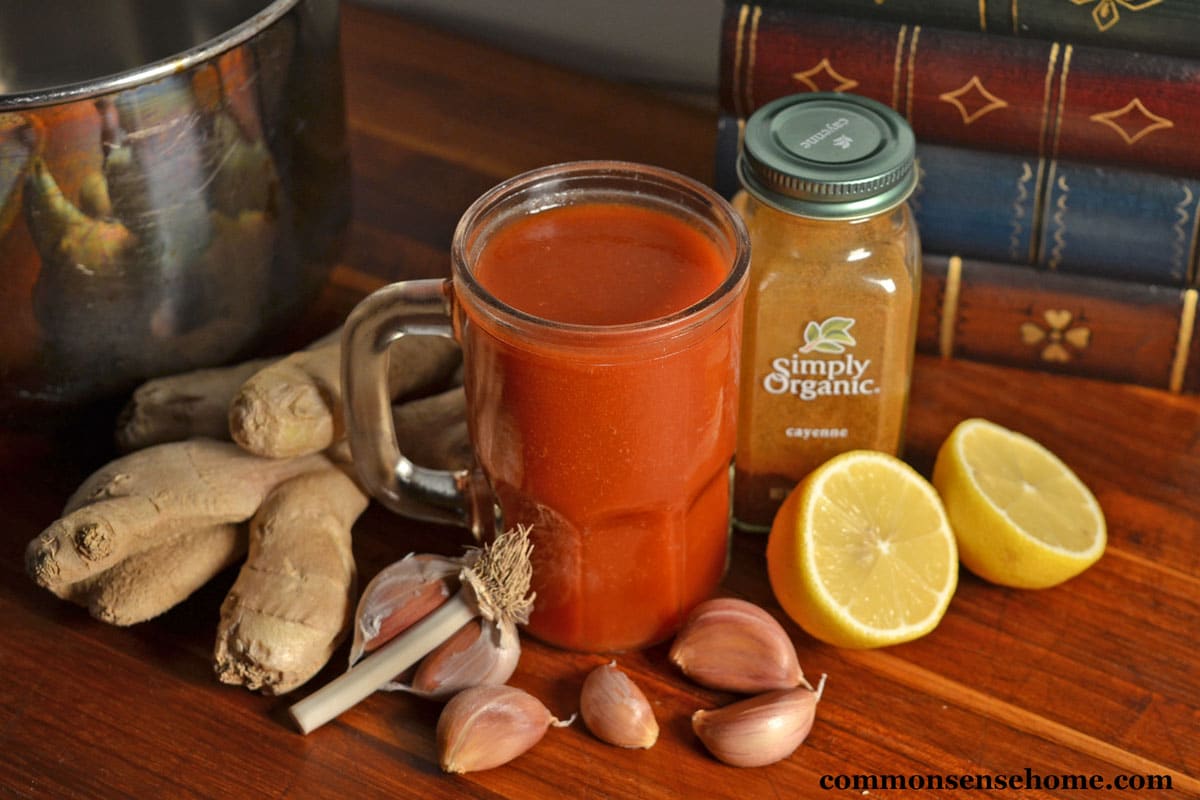
#3 – Elderberry Syrup
Elderberry syrup is great sore throat remedy for kids. When my youngest son was little, he dealt with frequent coughs and sore throat. (He was a preemie.) I tried regular commercial cough syrups, but they would upset his stomach.
That’s when I first learned about elderberry syrup. I was so grateful to find something that soothed his sore throat and cough without side effects. Now we grow our own elderberries and make our own syrup. You can try our elderberry syrup recipe, too.
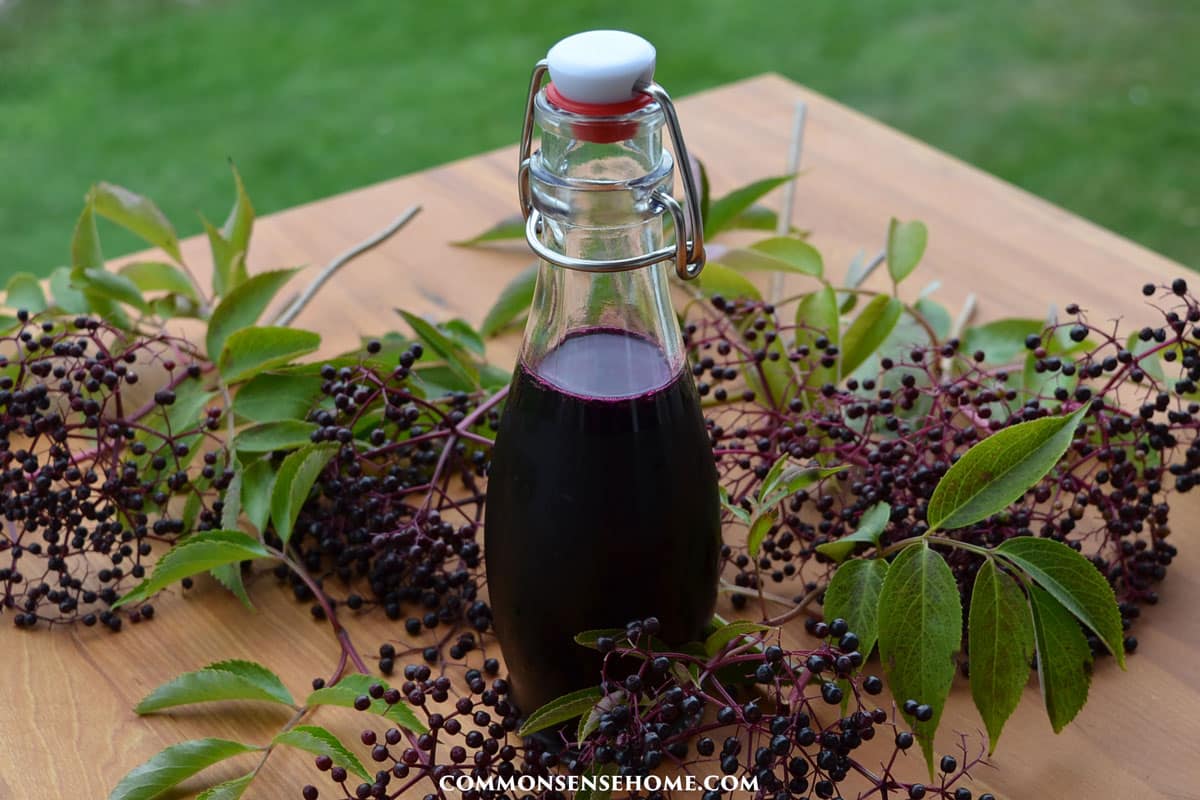
#4 – Cayenne
Cayenne contains with capsaicin, a natural anti-inflammatory and pain reliever. This is why you often see it used in pain relief salves.
To use cayenne as a natural sore throat remedy, add 1/8 teaspoon cayenne powder to a glass of warm water. Gargle with this water several times per day, or as needed. You may also add 1/4 teaspoon of sea salt.
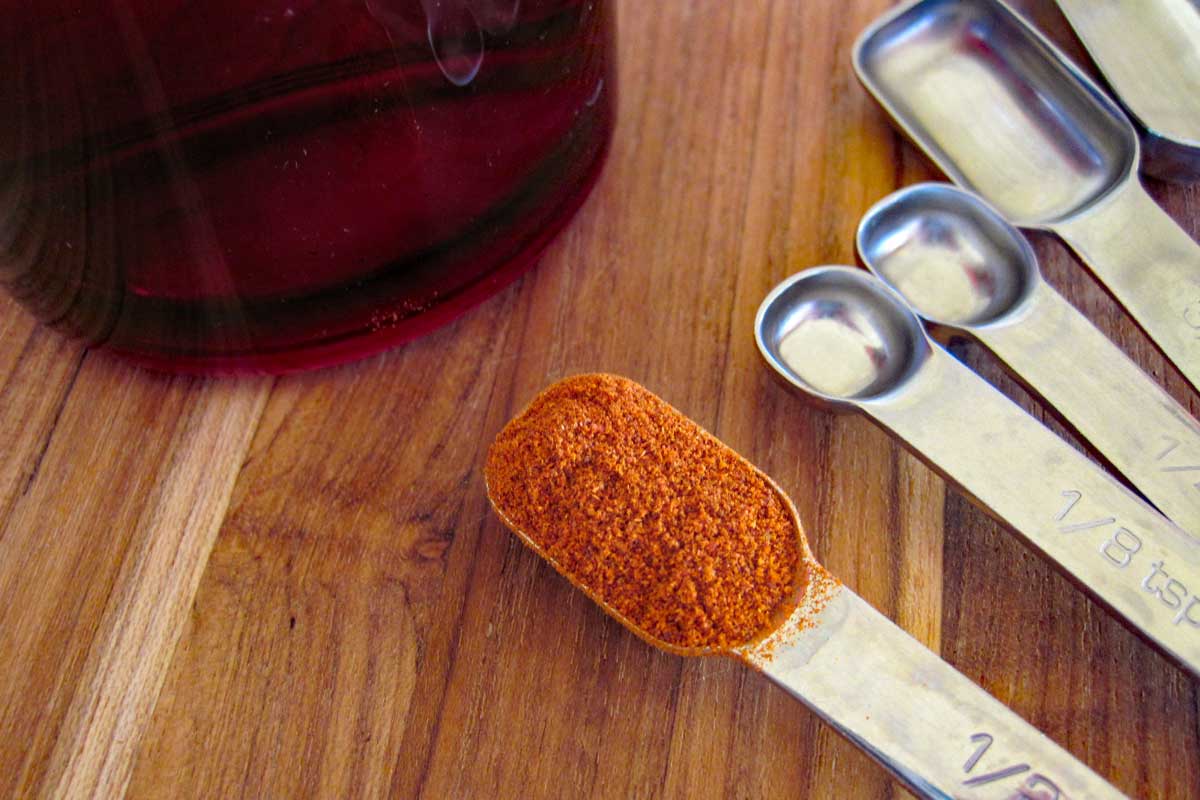
If you don’t have cayenne powder, you can check the pantry or refrigerator for hot pepper sauce. Put several drops of peppery goodness in warm water, and gargle as above.
Cayenne may interact with some prescription medications, so make sure to check for interactions before using it.
#5 – Honey
Combining honey with cayenne provides a “one two punch” as a sore throat remedy. First, the capsaicin desensitizes the throat, then the honey coats and soothes. It’s also great for soothing coughs.
Honey is naturally antimicrobial, and studies show that it helps relieve symptoms of upper respiratory tract infections.
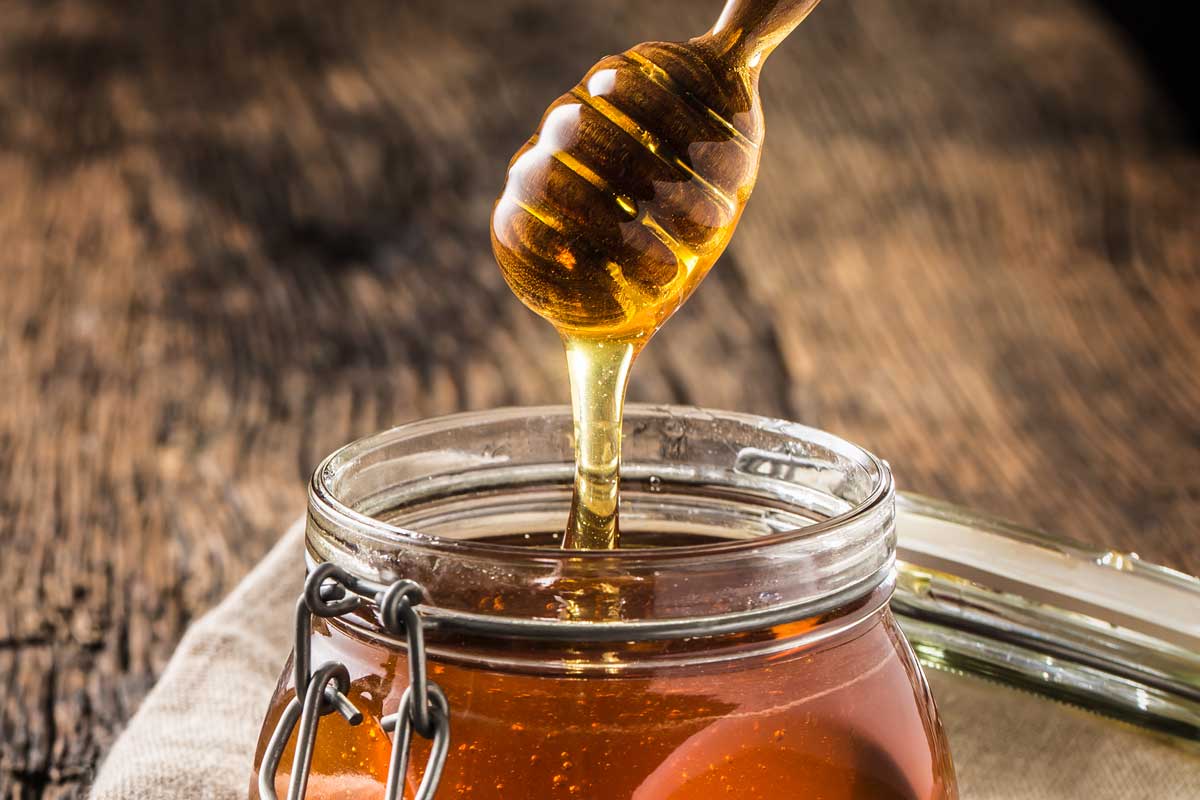
Try a spoonful of honey, cinnamon mixed with honey, ginger honey, or make homemade cough drops. Add honey to warm drinks, or mix a little honey and cayenne together. Take as needed to soothe your throat.
#6 – Warm Salt Water
If you’re battling bacteria or a virus, it can throw your throat pH out of whack. A warm salt water gargle helps to restore the proper pH levels.
The warmth also acts to relax tight, aching throat muscles, making it an effective natural sore throat remedy. Use 1/4 teaspoon salt per 4 ounces of warm water, and gargle several times per day.
#7 – Zinc Lozenges
Zinc interferes with the ability of rhinoviruses to reproduce and lock on to cells. Rhinoviruses are responsible for most colds. These taste a little funny, so you may want to rotate them with other sore throat remedies.
In a study of zinc cold lozenges, the sore throats of the zinc group lasted only one day, compared to three days for the control group. Patients took one zinc lozenge every two hours while awake.
Would you like to save this?
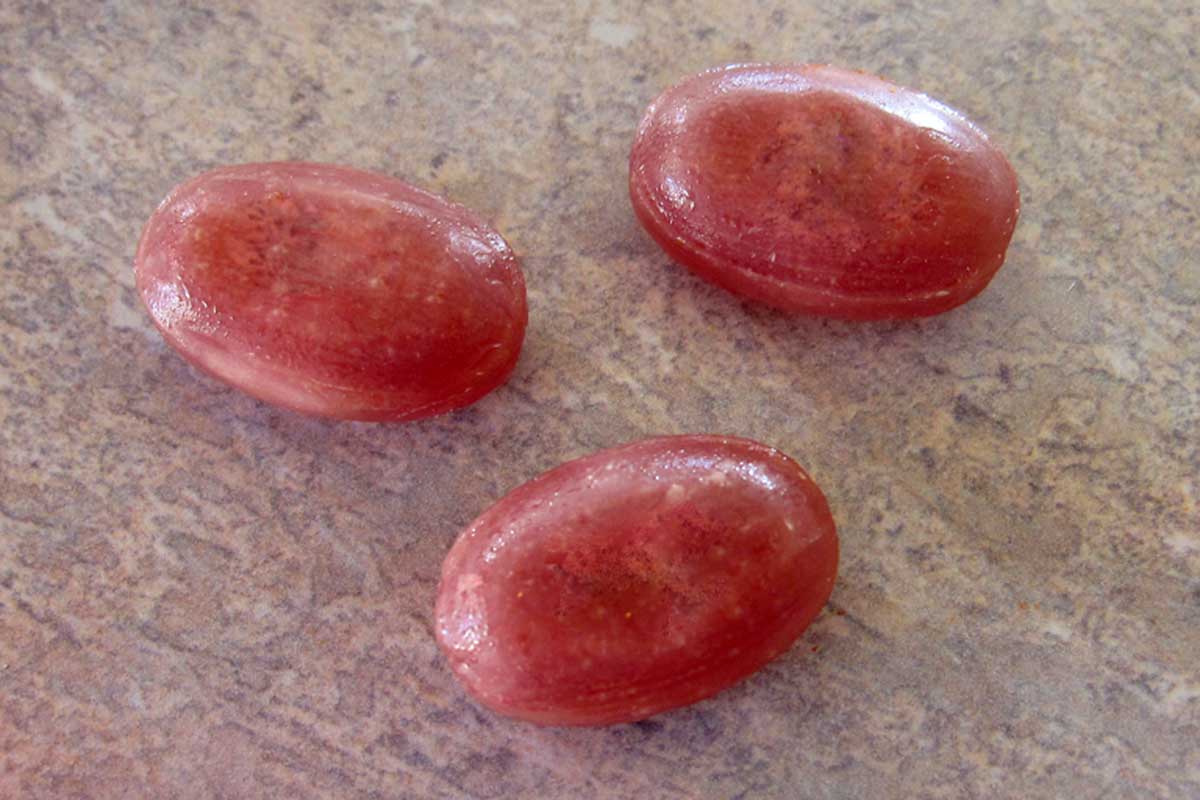
#8 – Pickle Juice
Combine vinegar and salt in a more tasty package, and you have pickle juice sore throat relief. Some folks swig it right out of the jar (stick to your own jar, please). Others gargle from a glass.
Warm pickle juice relaxes your throat, but I think it tastes better chilled. Raw sauerkraut juice, which also contains vitamin C and probiotics, is another “pickle” variation.
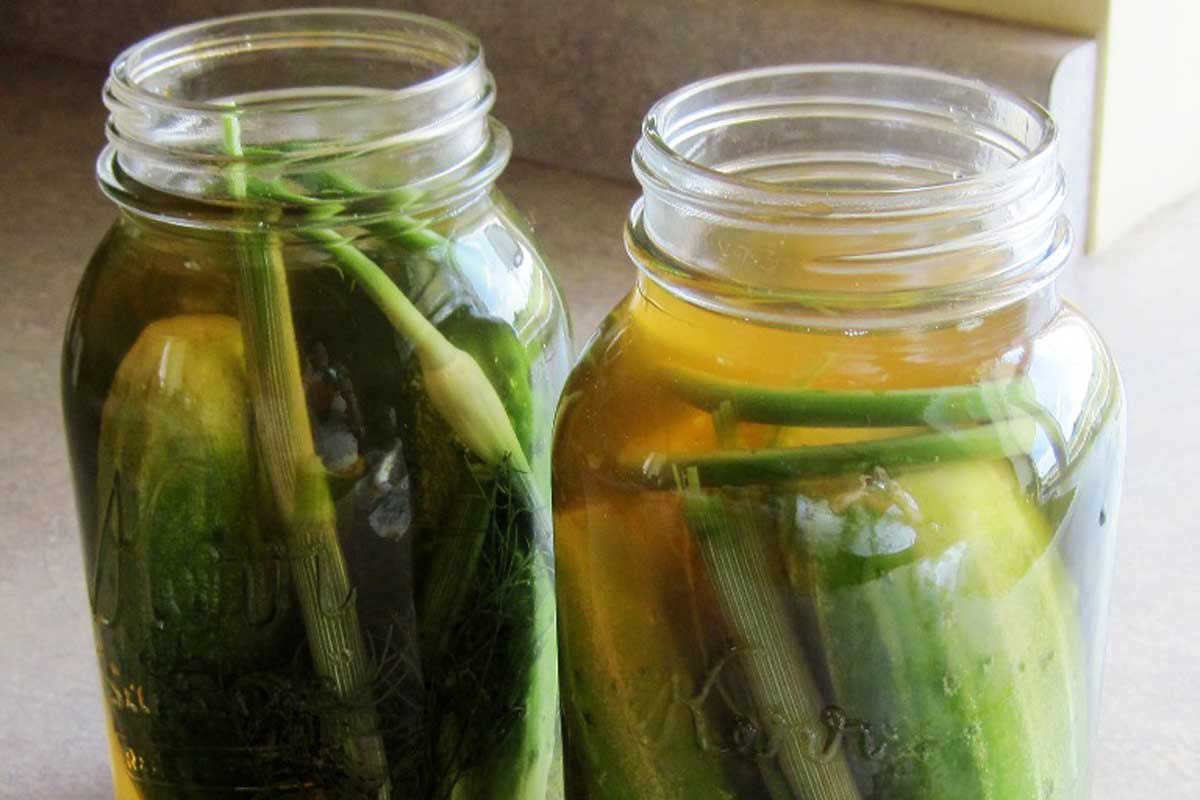
#9 – Sore Throat Teas
Sipping any warm liquid will help, but some of the best teas for sore throat include:
- Chamomile – relaxing, soothing
- Licorice root – lightly sweet, antimicrobial
- Turmeric – antimicrobial, anti-inflammatory
- Peppermint – cooling, soothing
- Ginger – antibacterial, anti-inflammatory
- Cinnamon – anti-inflammatory and antimicrobial
- Horehound – anti-inflammatory, mild expectorant
- Slippery elm – coats and soothes
- Rose hips, which are high in vitamin C
- Elderberry and echinacea, which are known virus fighters
- Cloves, which contain eugenol, a natural numbing agent
Pair your favorite herbal cold and cough tea with honey and lemon to help coat your throat and break up mucus. Sipping warm broth is also good.
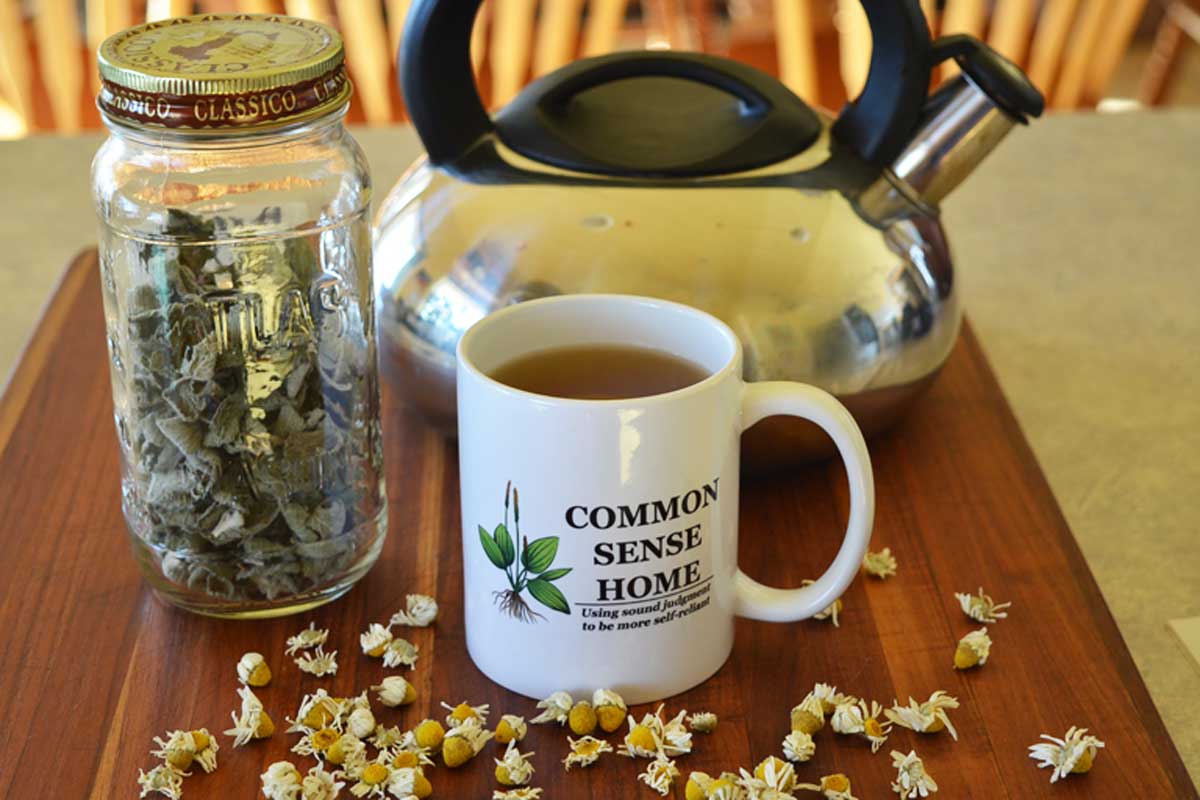
Herbal Sore Throat Tea Blend
This herbal sore throat tea from the Herbal Academy brings together:
- sage (an antihistamine)
- licorice root or slippery elm (to coat and soothe)
- cinnamon (antiviral, antibacterial)
- ginger (warming and boosts the immune system)
Add some lemon and honey and a sprinkle of cayenne pepper for extra “oomph”! This tea opens airways and reduces sinus drainage without the pharmaceutical side effects.
Herbal Sore Throat Tea Ingredients
- 1 part sage leaf
- ½ part licorice root or slippery elm
- ¼ part cinnamon chips
- ¼ part ginger root
For instance, combine 1/4 cup sage leaf, 2 tablespoons slippery elm, and one tablespoon each cinnamon chips and ginger root. Increase amounts for a larger batch.
Directions
- Combine herbs in a bowl and store in a sealed container when not in use.
- To Make a Medicinal Infusion – In a glass quart jar, pour boiling water over 4-6 Tablespoons herbal tea, filling the jar to the top. (For one cup of tea, use 1 tablespoon of herb mix.)
- Allow to steep, covered, for at least 15 minutes.
- Strain the herbs and enjoy! Breath the vapors of your tea to maximize the benefits.
- You can refrigerate any excess infusion and heat it up to drink later.
#10 – Garlic
Garlic has antiviral and antibacterial properties, so it fights against many types of sore throat causes. The pungent smell of garlic comes from the sulfur rich compounds that it contains, including allicin and alliin. Cooking makes these compounds less effective, so raw is the way to go.
Crushing or chopping the garlic and letting it sit before use will help to produce more of the helpful sulfur compounds. Let sit at least fifteen minutes, but consume within an hour of crushing/chopping.
To make your raw garlic a little easier to swallow:
- mix it with some honey and lemon
- add it to your herbal tea of choice
- or steep it in hot water to make a simple garlic tea
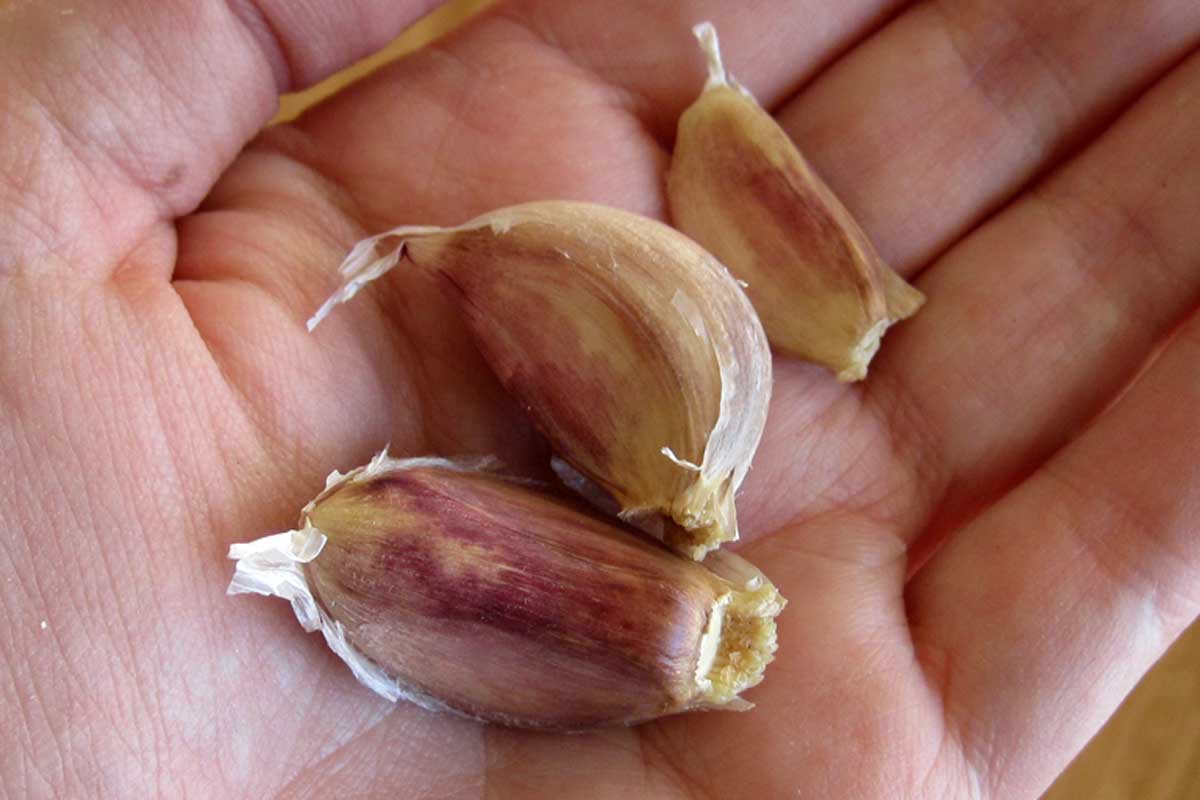
FAQ
I like the first two sore throat remedies best – apple cider vinegar tea and tomato tea. Each of these teas combine several treatments into one hot drink that soothes your throat and boosts your immune system.
Sometimes winter dry air causes sore throat pain. Sometimes it’s from the common cold, flu or other viral infection. Bacterial infections such as strep throat can also make your throat feel raw.
Try a warm shower or humidifier to help with dry air, and rest your voice if you can. Remember, if pain is severe or accompanied by high fever, bleeding, or trouble breathing, please see your healthcare provider.
If your sore throat pain is from digestive upset, please see “10 Home Remedies for Acid Reflux“.
These sore throat remedies are inexpensive and easy to use. With some rest and care, you should feel better quickly.
What’s your favorite sore throat remedy? Leave a comment below to share your thoughts. (Make sure to scroll through the comments to see what others shared, too. Lots of good tips!)

This article is written by Laurie Neverman. Laurie is a lifelong learner with a passion for natural remedies and holistic healing. She’s successfully improved her eyesight and cleared her psoriasis.
Originally published in 2015, last updated in 2024.


I had the good fortune to get some instruction on Ayurvedic principles and a daily routine that supported good general health, as well as instruction on the use of a number of simple home remedies. One of the preventive techniques protects nasal and respiratory passages. After a bath or before going out for the day, particularly in dry, cold weather, I was instructed to wash and dry my hands, pour a few drops of refined sesame oil onto my palm, and with the other had, dip my pinky finger in the oil, then swab the inside of my nostrils with the oil. I would then pinch my nostrils together and take a quick sniff as I released my nostrils. Sesame oil has anti-microbial properties, has a “heating” quality, is very emollient and absorbs into tissue well. This treatment will lightly coat the nasal passages and work its way down your throat, protecting nasal and respiratory passages from the drying and cracking that results from windy, cold weather, and makes us more resistant to invasive infections as a result. Be aware that sesame oil is so penetrating that it can rapidly soak into clothing and is very challenging to washout. If you are not able to access refined sesame oil, olive oil is an acceptable substitute.
I use a remedy that my grandmother told me and always used herself.
1 tsp vinegar
1 tsp butter
1 tsp sugar
Warm it so that the butter & sugar melts (about 15 sec if using a microwave) and then sip it.
Do this 3-4 times a day & the sore throat goes within a couple of days.
The vinegar helps kill any infection, the butter coats & soothes the throat & the sugar just makes it sweeter (you could possibly use honey but I haven’t tried it).
Thanks! I’m sure honey would work, too.
I have tonsillitis/strep will the throat remedies help for this please just had some pickle juice hoping it helps
Strep is likely to require more than pickle juice. Are you sure you have strep throat? If so, please be careful. Some people use colloidal silver, or herbal antibiotics.
I love number 5 – the pickle juice – I’ve never thought of that! My home remedy is at the signs of a sore throat I put on a scarf and wear it until it goes away. As a chronic sufferer I’ve found this has help prevent it developing to something more that a scratchy throat a lot of times.
I gargle with room temp raw ACV watered down a little and then just drink it. Gargling with it helps a sore throat too…will have to try to warm with honey.
Study conducted by Andrew Weil of the University of Arizona College of Medicine proved that garlic can strengthen the immune system, stimulate employment by T cells in charge of fighting infection. People with chronic infection are encouraged to consume raw garlic 1 to 2 cloves every day. This can be found written in Natural Health, Natural Medicine.
My go-to for when I feel like I’m getting sick is to immediately take vitamin C and zinc. Every hour, if necessary. I take it in water that I put echinacea tincture in. I then take a shot of either my homemade Fire Cider (find the recipe from Rosemary Gladstar on Mountain Rose Herbs blog) or my homemade elderberry syrup.
When a co worker got back from a cross-country flight and was instructed to work with a 103* fever, I also added ONE drop of oil of Oregano to all water I drank.
For stuffy noses, and gunky throats, I alternate a neti pot with salt and a TINY bit of ACV with the mother (Braggs) and gargle with hot water, salt, ACV, ONE drop of oil of oregano in it, first thing in the morning. Don’t overdo the oil of oregano! It is extremely potent, and don’t use it in your neti pot, as you will “burn” your nasal passages. I did this for three days after the co worker got back and I had felt a tiny sore throat coming on, and now I feel fine! ( another co worker got it, though!)
I regularly use oregano, cilantro and turmeric in my cooking, as well as onion and garlic. I have not been sick for years!
I try to eat as much organic as I can, don’t use commercial cleaners or makeup but make my own.
I don’t consume HFCS, ANY soy, or corn (corn, unless its non GMO and organic), and get plenty of sleep.
I NEVER get shots for flu or any other illnesses, as they are worse than the malady, and according to alternative news, the don’t work!
I know this is long, but I feel that it may be beneficial to someone who is sick a lot, and would really like tips to be healthier.
I especially like the idea of drinking the ‘juice’ from sauerkraut (or pickles, but the S. would be more beneficial due to the probiotics in the fermented ‘kraut).
Thanks for the ideas!
I have a thieves vinegar recipe on the site that is somewhat similar to fire cider. Plenty of spice! As you’ve mentioned, there are many, many ways we can boost our immune system naturally without the harsh side effects of pharmaceuticals.
This couldnt have come at a more perfect time. I just woke up with a scratchy throat and found this post on my inbox! Thank you for taking the time out of your day to write this up.
You’re welcome, Kayla. Mine has been scratchy this week, too, but it’s better today – and I think we may see temps in the double digits above zero!
Laurie, these are great natural remedies for sore throats! I am pinning and sharing. You rock! Linda
Thanks, Linda. I’ve been working my way through them this week, as the cold dry air is making my throat all scratchy.